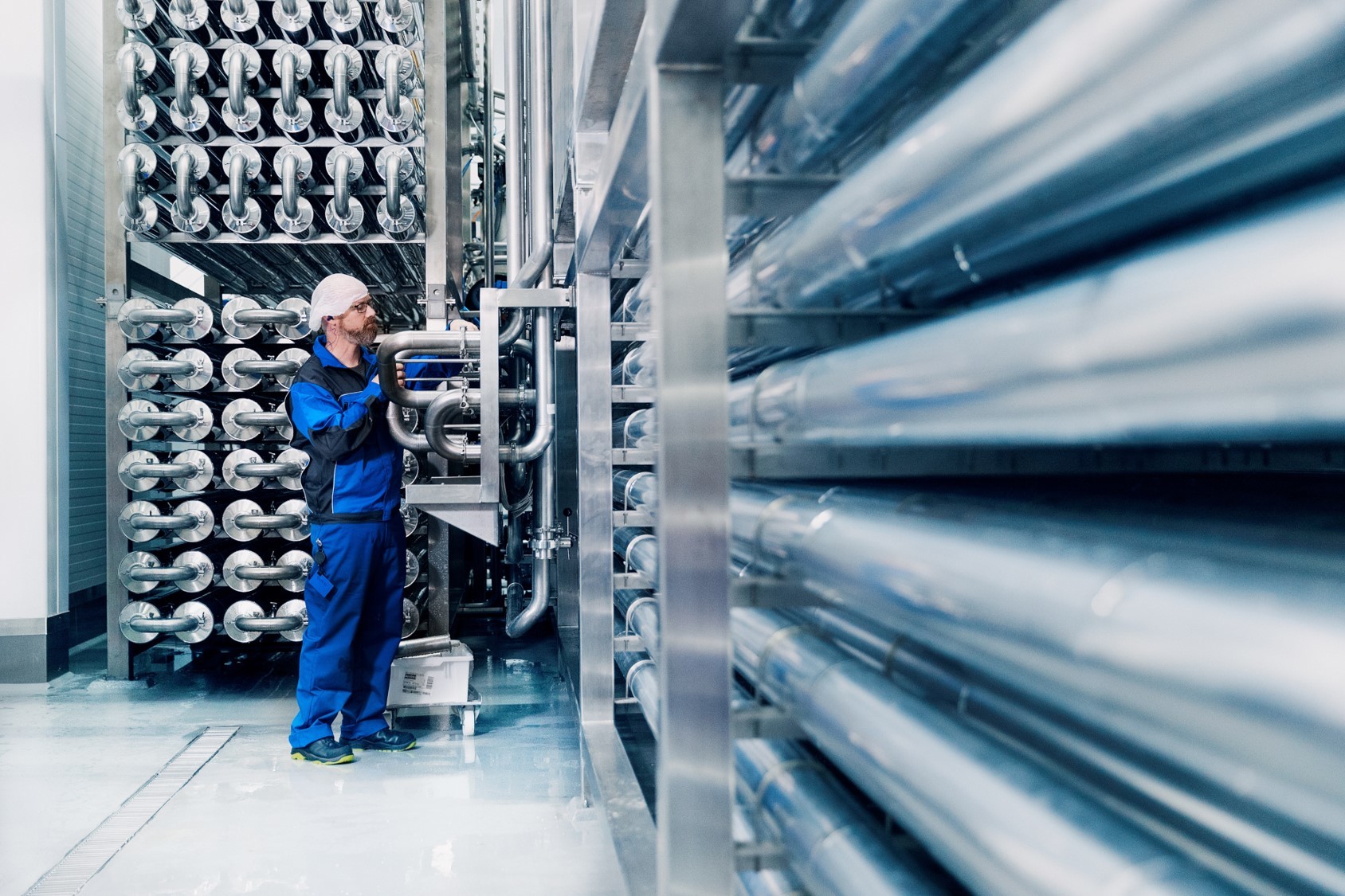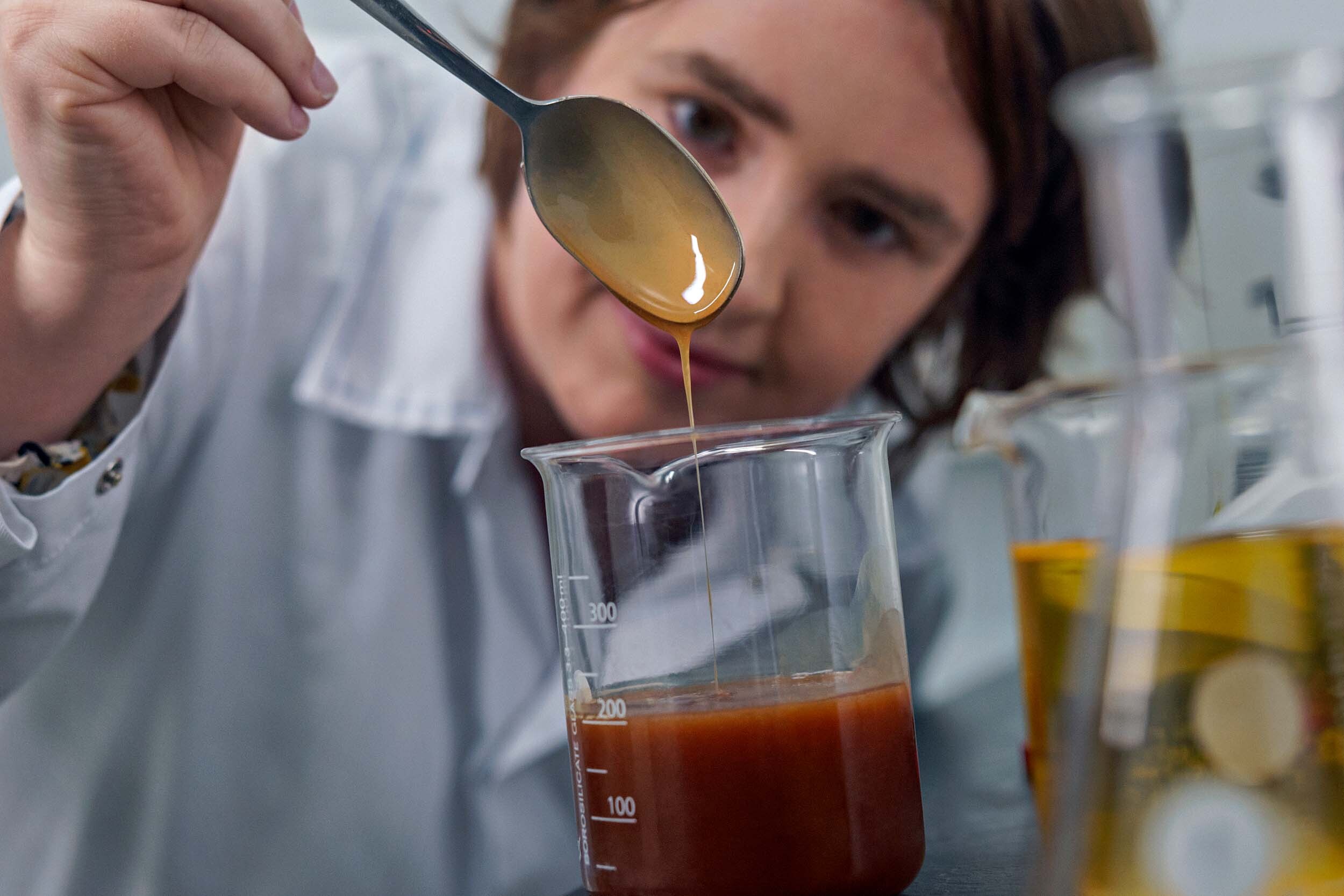How Norilia creates added value using biotechnology
Low-value raw materials can be converted into ingredients with great potential, thanks to biotechnology.
What is biotechnology?
In nature, and in our bodies, there are microorganisms and enzymes that use biological processes to break down raw materials so that the nutrients can be utilised, or that build new materials necessary for the growth and function of living organisms. It is possible to utilise these biological processes on an industrial scale, and this is known as industrial biotechnology. For example, we can use such processes to refine rest rawmaterials from the meat and egg industry – what we call plus products. At Norilia, we see biotechnology as a valuable tool to increase resource utilisation and value creation from rest raw materials. We have already successfully industrialised a biotechnology process to refine rest raw materials from poultry at Bioco, and we are currently researching further opportunities to use biological processes on other materials.
At Norilia, we specifically use two biotech processes:
- Enzymatic hydrolysis
- Fermentation


At Bioco we have developed an enzymatic hydrolysis process to refine chicken and turkey bone material.
Photo: Sune Eriksen
35% of biomass
Co-streams, or plus-products as we call them, make up around 35% of all the biomass received by the meat industry from animals and eggs.
What is enzymatic hydrolysis?
There are many different types of enzymes in nature, including in our digestive system. We have enzymes to break down raw materials and to build new materials. We are particularly interested in the processes that break down materials, because these can be used to improve the utilisation of the nutrients to be found in residual materials.
For instance, the enzymes in our stomach break down our food so that we can absorb the nutrients. This is a process that we are endeavouring to recreate on an industrial scale.
By means of this process, known as enzymatic hydrolysis, we are able to break down nutrient-rich rest rawmaterials that would otherwise not have been used for food for humans, and separate out the proteins, fat and minerals. These fractions can then be converted into new ingredients, such as protein powder and oil, which can be used in food or as dietary supplements. This allows us to use rest raw materials for human food. Our goal at Norilia is that as much as possible of the raw materials approved for food use will be used as human food.
At Bioco we have developed an enzymatic hydrolysis process to refine chicken and turkey bone material. This is a process that would also be suitable for other types of raw material, and we foresee great opportunities to use this process on much of our low-value raw material.
Industrial biotechnology
What is Bioco?
Bioco is a biotechnology and biorefining company that is part of Nortura’s and the Norwegian agricultural cooperative Felleskjøpet’s commitment to sustainability and increased resource utilisation. Norilia is responsible for sales and marketing of all ingredients produced by Bioco.
You can read more about Bioco here.
What is fermentation?
Fermentation is a bioprocess that uses microorganisms to break down raw materials to make something new. Microorganisms can be divided into various groups, the largest of which is bacteria. Other microorganisms include yeasts, fungi and microalgae. Using microorganisms for fermentation is nothing new – people have been doing it for a very long time, not least in brewing. However, using fermentation on rest rawmaterials from animals is a new and exciting area of biotechnology.
From an industrial perspective, fermentation can be widely used to refine materials. For example, at Norilia we are researching how we can use fermentation processes to break down feathers, a raw material that is very challenging to process. If we can successfully break down feathers, the proteins they contain could potentially be used in fish feed etc.
From a natural process to industrial scale
Biotechnology and new refining methods are under constant development, and a great deal of research is ongoing in the area. At Norilia, we are working closely with a number of research environments, looking at how results from the research can be used industrially to create added value. One of the research projects that we are using to gather knowledge is SFI Industrial Biotechnology. (SFI refers to the Centres for Research-based Innovation scheme run by the Research Council of Norway.) Some of the foremost research environments in the area are collaborating on the project, including the research organisation SINTEF, NMBU (the Norwegian University of Life Sciences), NTNU (the Norwegian University of Science and Technology) and the independent research institute NORCE. These are joined by various industrial partners working on the development of biotechnology within their own companies.
“Norilia’s work on rest raw materials is absolutely vital,” states Håvard Sletta, Chief Market Developer for biotechnology at SINTEF Industry and Centre Director of SFI Industrial Biotechnology. “Simply put, they have abolished the term ‘waste’. In the future, we will have to utilise all bioresources, making biotech processes very important indeed.”
“There are a large number of very important products you can make using industrial biotechnology,” he continues.


Marije Oostindjer, Chief Adviser for Bioprocesses at Norilia
Photo: Sune Eriksen
The research environments are very keen for this research not to take place in isolation. It is important to have an industrial partner that can take the research and run with it.
“In addition to contributing our own knowledge and input to the research, our most important role is to put the research to use for industrial value-creation,” says Marije Oostindjer, Chief Advisor for Bioprocesses and Business Strategy at Norilia. “We are also working actively to set up new research projects that could foster better utilisation of our residual materials.”
Sletta adds: “After all, the goal of SFI is to give industrial biotechnology a boost nationally, so that companies interested in using biotech processes are better equipped to be competitive going forward. We are endeavouring to maintain a close connection between the industrial players and the researchers. This is the key to success. And this is how we ensure that we are working on things that are relevant to the companies. When the research proves really interesting to an industry, they can incorporate it into their own projects and apply it to their business.”


Heidi Alvestrand, Director of Business Development at Norilia
Photo: Sune Eriksen
Technology for the future
The research and use of bioprocesses are an important part of our strategy.
“We are convinced that biotechnology will play a major role in the green transition and will be an important tool for better resource utilisation,” states Heidi Alvestrand, Director of Business Development at Norilia. “Biotechnology can give us new ways to refine our raw materials, enabling the production of new sustainable products. The technology is advancing rapidly, and we want to be part of this journey.”
Read more about our research projects.







 At Bioco we have developed an enzymatic hydrolysis process to refine chicken and turkey bone material.
At Bioco we have developed an enzymatic hydrolysis process to refine chicken and turkey bone material.




